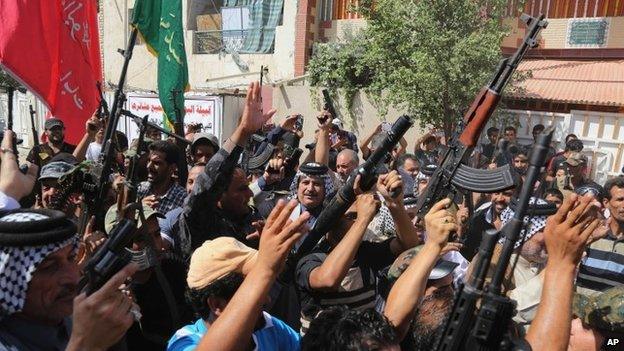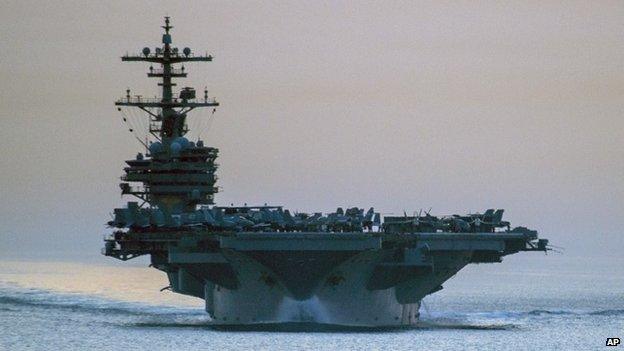Iraq conflict: Sunni militant push on Baghdad 'halted'
- Published
Kurdish and Shia groups have formed militias to combat the Sunni insurgents, as Paul Wood reports
Iraqi government forces, backed by Shia Muslim and Kurdish militias, are reportedly holding back an advance by Sunni militants north of Baghdad.
A number of towns have been retaken from the rebels, but they still control the key cities of Tikrit and Mosul.
Reports speak of heavy clashes round the city of Tal Afar, west of Mosul, with mortar shelling of some districts.
A US aircraft carrier has been deployed to the Gulf in response to the escalating violence.
In a televised news conference, Iraqi army spokesman Lt Gen Qasim Ata, said the military had "regained the initiative", scoring successes against the militants in several areas and killing 279 of them.
However, the government's figures could not be independently verified.
In Tal Afar, inhabited mainly by Sunni and Shia Turkmens, residents told the BBC that troops clashed with militants trying to enter the city.
Government officials, quoted by AP news agency, said the rebels were using rockets captured from troops, and the local garrison had suffered heavy casualties.
Tony Blair: "Don't believe washing our hands of it and walking away will solve the problem"
The BBC's Jim Muir, reporting from northern Iraq, says government forces are building up in the city of Samarra.
They appear to be preparing for a counter-offensive on Tikrit - the hometown of Iraq's former President Saddam Hussein, who was toppled by the US invasion in 2003 - our correspondent says.
A resident of Tikrit, speaking to the BBC, said clashes were under way between militants and soldiers based at former US "Camp Speicher", north of the city.
In other developments:
Three Iraqi soldiers and three Shia militiamen were killed in a mortar attack on a military recruitment centre near the city of Baquba, north-east of Baghdad
In one town that changed hands, Ishaq, security forces said they had found the incinerated bodies of 12 policemen
Seven Kurdish fighters were killed by mistake by a government helicopter in the town of Jalawla
Many Sunni rebels are fighting under the banner of the Islamic State in Iraq and the Levant (ISIS), an offshoot from al-Qaeda.
Iraq's most senior Shia cleric, Grand Ayatollah Ali al-Sistani, has issued a call to arms to fellow Shia, and there are reports that thousands have already joined militias.

There are reports that thousands of men have joined Shia militias

At the scene: John Simpson, BBC News, Baghdad
On my way into the BBC office [on Sunday] I bumped into a government minister who I know and he told me that there was a real state of panic here a few days ago. Thursday in particular, he said, nobody knew what to say; they could scarcely speak to each other, they were so nervous.
But since then, the idea that Shia fighters, Shia volunteers should come forward and back the army up has restored a certain amount of balance. He said that the government feels a lot more settled at the moment.
Of course you could say that's a problem for the future of this country, if one religious group is setting out to fight another one - and that blatantly. But that is something else, something for the future. For the moment it seems that there is a bit of a sense that things are settling down.


The USS George HW Bush carries dozens of fighter jets
The USS George HW Bush, which carries dozens of fighter jets, is heading for the Gulf, accompanied by two more warships.
But the US says no US troops will be deployed on the ground in Iraq and Secretary of State John Kerry has repeated American demands for Iraqi leaders to put aside their differences.
Former General Muzhir al Qaisi: "The difference between us and ISIS...we fight with rules, with Geneva convention....[they] are barbarians"
Correspondents say Washington is frustrated with Iraqi Prime Minister Nouri al-Maliki and his Shia-led government for ignoring the concerns of Sunnis and Kurds.
Iranian President Hassan Rouhani said on Saturday he had offered direct assistance to Baghdad, but denied that he had sent troops to fight in Iraq.
However, BBC Persian's regional analyst Kasra Naji has been told that more than 130 of Iran's Revolutionary Guards have arrived to provide training and advice.
Iran has said it could be prepared to work with the US, despite the bitter enmity between the two countries, to fight Sunni insurgents.
Meanwhile, former UK Prime Minister Tony Blair has insisted that the 2003 Anglo-US invasion of Iraq is not to blame for the violent insurgency now gripping the country.
Speaking to the BBC, he said there would still be a "major problem" in the country even without the ousting of Saddam Hussein.

ISIS in Iraq
The Islamic State in Iraq and the Levant (ISIS) has 3,000 to 5,000 fighters, and grew out of an al-Qaeda-linked organisation in Iraq
Joined in its offensives by other Sunni militant groups, including Saddam-era officers and soldiers, and disaffected Sunni tribal fighters
ISIS has exploited the standoff between the Iraqi government and the minority Sunni Arab community, which complains that Shia Prime Minister Nouri Maliki is monopolising power
The organisation is led by Abu Bakr al-Baghdadi, an obscure figure regarded as a battlefield commander and tactician

